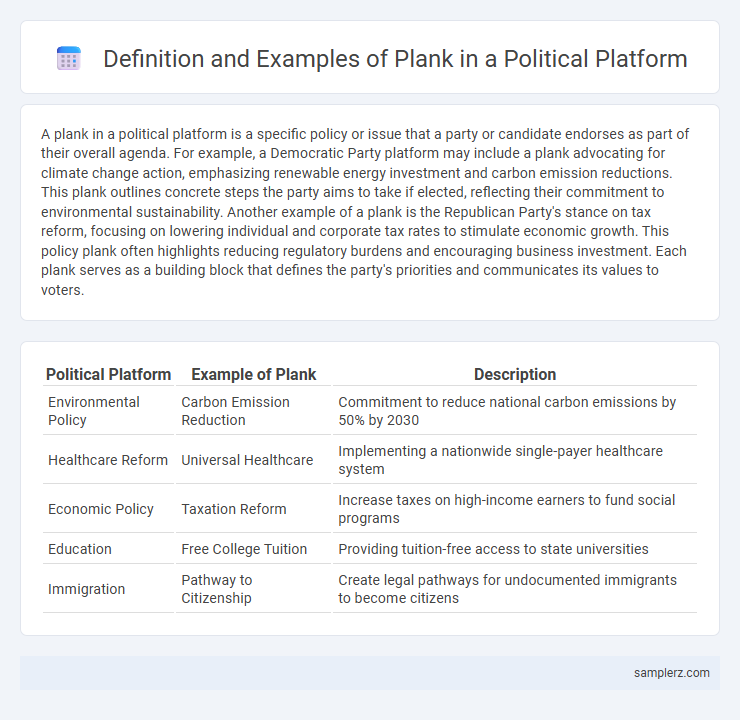A plank in a political platform is a specific policy or issue that a party or candidate endorses as part of their overall agenda. For example, a Democratic Party platform may include a plank advocating for climate change action, emphasizing renewable energy investment and carbon emission reductions. This plank outlines concrete steps the party aims to take if elected, reflecting their commitment to environmental sustainability. Another example of a plank is the Republican Party's stance on tax reform, focusing on lowering individual and corporate tax rates to stimulate economic growth. This policy plank often highlights reducing regulatory burdens and encouraging business investment. Each plank serves as a building block that defines the party's priorities and communicates its values to voters.
Table of Comparison
| Political Platform | Example of Plank | Description |
|---|---|---|
| Environmental Policy | Carbon Emission Reduction | Commitment to reduce national carbon emissions by 50% by 2030 |
| Healthcare Reform | Universal Healthcare | Implementing a nationwide single-payer healthcare system |
| Economic Policy | Taxation Reform | Increase taxes on high-income earners to fund social programs |
| Education | Free College Tuition | Providing tuition-free access to state universities |
| Immigration | Pathway to Citizenship | Create legal pathways for undocumented immigrants to become citizens |
Key Economic Reform Plank: Tax Policy Overhaul
A key economic reform plank in a political platform often involves a comprehensive tax policy overhaul aimed at simplifying the tax code, reducing corporate tax rates, and providing tax relief to middle-income families. This reform targets boosting economic growth by incentivizing investment and increasing disposable income for consumers. By restructuring tax brackets and closing loopholes, the policy seeks to enhance fairness and increase government revenue stability.
Healthcare Accessibility: Universal Coverage Advocacy
Universal Coverage Advocacy is a key plank in political platforms aiming to ensure healthcare accessibility by promoting policies that guarantee health insurance for all citizens regardless of income or employment status. This approach emphasizes the expansion of Medicaid, the introduction of public options, and the elimination of pre-existing condition exclusions to reduce disparities in health outcomes. Commitment to universal healthcare coverage addresses systemic barriers, improves preventive care, and lowers overall national healthcare costs.
Climate Change Response: Renewable Energy Commitment
A key plank in the political platform is the commitment to transitioning 50% of national energy consumption to renewable sources by 2030, aimed at drastically reducing carbon emissions. This includes investments in solar, wind, and hydropower infrastructure, coupled with subsidies for clean energy innovations to accelerate adoption. These measures align with the Paris Agreement targets and demonstrate a proactive stance on mitigating climate change impacts.
Education Policy: Tuition-Free College Proposal
The plank of Tuition-Free College Proposal in a political platform advocates for eliminating tuition fees at public colleges and universities to increase accessibility to higher education. This policy aims to reduce student debt burdens, promote equal opportunities, and invest in the nation's skilled workforce. Several states and countries have adopted or piloted such initiatives, demonstrating potential long-term economic and social benefits.
Criminal Justice Reform: Ending Mass Incarceration
Criminal justice reform, a key plank in many political platforms, emphasizes ending mass incarceration through measures such as sentencing reform, eliminating mandatory minimum sentences, and promoting alternatives to imprisonment like rehabilitation programs. Targeted policies include reducing the prison population by addressing systemic biases and investing in community-based initiatives that support reentry and reduce recidivism rates. These efforts collectively aim to create a more equitable justice system that prioritizes public safety and second chances.
Immigration Policy: Pathway to Citizenship
A key plank in a political platform is the Immigration Policy advocating for a clear Pathway to Citizenship, which typically includes criteria such as residency duration, language proficiency, and background checks. This policy aims to integrate undocumented immigrants by providing legal status and eventual citizenship, fostering economic growth and social inclusion. Emphasizing comprehensive reforms, the platform often supports measures like family reunification and protection of DACA recipients to address humanitarian and workforce needs.
Gun Control Measures: Universal Background Checks
Universal background checks represent a critical plank in political party platforms advocating for enhanced gun control measures, aiming to prevent firearms from reaching individuals with criminal records or mental health issues. This policy mandates that all firearm purchases, including private sales and gun shows, undergo a thorough federal background check to close existing loopholes in the National Instant Criminal Background Check System (NICS). Implementing universal background checks has been shown to correlate with reductions in gun violence rates and increased public safety according to multiple studies.
Social Welfare: Expanding Childcare Benefits
Expanding childcare benefits is a vital plank in many political platforms aimed at strengthening social welfare by providing affordable, high-quality childcare to working families. This policy reduces economic burdens on parents, supports early childhood development, and promotes workforce participation, particularly among women. Governments may propose subsidies, tax credits, or direct funding to childcare providers to enhance accessibility and quality.
National Security: Cybersecurity Enhancement Plan
The Cybersecurity Enhancement Plan is a critical plank within the National Security platform, aiming to protect government infrastructure and private sectors from cyber threats. It emphasizes strengthening federal cybersecurity protocols, increasing funding for advanced threat detection systems, and promoting public-private partnerships to mitigate cyberattacks. This initiative seeks to safeguard national data assets and ensure resilience against evolving digital espionage and cyber warfare tactics.
Voting Rights: Protecting Democratic Access
Voting rights form a critical plank in political platforms aimed at safeguarding democratic participation by advocating for policies that expand ballot access, such as automatic voter registration and extended early voting periods. Efforts focus on eliminating barriers like voter ID laws and purging voter rolls, which disproportionately affect minority communities. Strengthening these protections ensures equitable participation and upholds the integrity of the electoral process.

example of plank in platform Infographic
 samplerz.com
samplerz.com